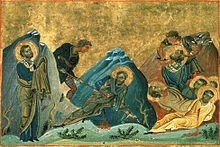|
Stachys the Apostle
Stachys the Apostle (Greek: Στάχυς, "ear-spike"; died 54) was the second bishop of Byzantium, from AD 38 to AD 54 according to tradition. Stachys is mentioned just one time in the New Testament as a person loved by Apostle Paul (Rom. 16:9).[2] Other than that, all information regarding him comes from tradition. He seemed to be closely connected to Andrew and Paul. Eusebius quotes Origen as saying that Andrew had preached in Asia Minor and in Scythia, along the Black Sea as far as the Volga and Kiev, hence he became a patron saint of Romania and Russia. According to tradition, Saint Andrew founded the See of Byzantium in 38, installing Stachys as bishop,[3] a position he held for sixteen years.[4] This See would later develop into the Patriarchate of Constantinople, having Apostle Andrew as its Patron Saint. Stachys founded a church at Argyropolis, and many people gathered there to hear him preach.[5] It is not clear if Stachys was the same person whom Paul calls "dear" in the Epistle to the Romans (Rom. 16:9), but he is always associated in traditions with five other apostles (Ampliatus, Urban, Apelles, Aristobulus and Narcissus) that are the very same names mentioned together with him by Paul in Romans 16:8–11. His feast day is on 31 October.[3] Notes
External links
|
||||||||||||||||||||||||||||||||||
